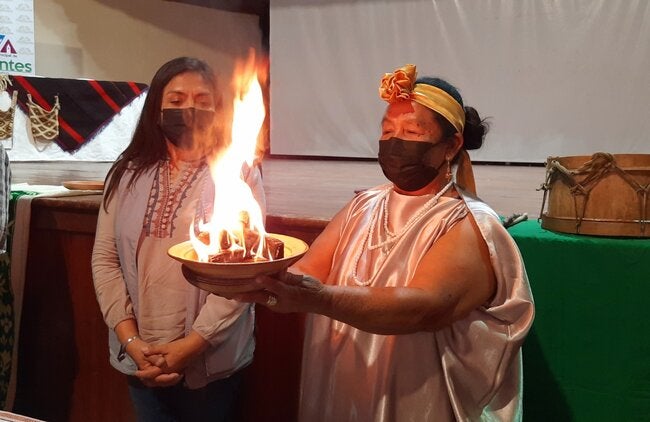LA PAZ, October 25, 2022 (PAHO/WHO) – Bolivia is a multicultural and multilingual country made up of 36 indigenous people who have their own concepts of health, well-being and disease. The Guaraní people of the Chaco in Santa Cruz, located in the middle of a dry forest, rich in biodiversity endemic to the development of traditional medicine by the so-called Ipayes, traditional healers or doctors.
Funded by the European Union, the Chaco Salud project has been implemented by the Pan American Health Organization/World Health Organization (PAHO/WHO) together with the United Nations Development Program (UNDP) and Plan International (PI) and in coordination with the National Directorate in Traditional Medicine under Under the supervision of the Ministry of Health and Sports, it has developed and promoted spaces for the inclusion and expression of traditional doctors in order to enhance their knowledge, exchange experiences and expand their participation in the health system.
Ipayes are essential actors in community health, articulated efficiently with health professionals, and are part of the culture and traditions of the Bolivian Chaco region.
Within the Guaraní indigenous people, traditional physicians are recognized as privileged to know the properties of medicinal plants with which they prepare remedies to treat, for example, kidney, bone and gallbladder problems and, in recent years, to combat symptoms from COVID-19.
In the early months of the pandemic, many communities struggled to avoid infection and disease progression. Much has been due to factors such as ignorance of the magnitude of COVID-19, which has caused even distrust of traditional medicine. In other areas, the main problem was the remoteness of the communities from the health centres. It was traditional medicine and the preparation of herbal mixtures such as chibi, mateko, yera yera, anamu, lemon and honey that mitigated the impact of the COVID-19 disease.
So far, the Chaco Salud Project has organized two meetings of representatives and traditional doctors from all over the Bolivian Chaco. The priority was to analyze problems in the practice of traditional medicine and achieve points of agreement to enhance the role of traditional doctors and the value of traditional medicine. These spaces allowed the management of certifications in the Unique Register of Bolivian Ancestral Medicine (RUMETRAB), the integration of services in health institutions, the formation of the Council of Traditional Medicine in each municipality and the implementation of artisanal laboratories of traditional medicine.
Thanks to these meetings, traditional Guaraní doctors will expand their knowledge through training in new medicinal herbs, they will have a better coordination of the development of their activities such as fairs of traditional medicine and, above all, they will play a greater role in containment, through their knowledge and work with the community. In the same way, there are developments in integration with medical staff to work together for the greater good of people and to improve the care of essential services such as community birth care.

“Social media evangelist. Student. Reader. Troublemaker. Typical introvert.”

:quality(85)/cloudfront-us-east-1.images.arcpublishing.com/infobae/TEQF6EONZRFGLLLDIDD4L2O4EE.jpg)

:quality(75)/cloudfront-us-east-1.images.arcpublishing.com/elcomercio/XU32LRAEZFDDPNVHLFU3CKVBYY.jpg)







More Stories
Venezuela ranks fourth in female leadership in science and technology in Latin America
In Portuguesa and Sucre they explore the wonderful world of science
The university court overturns the expulsion of two teachers and a chemical sciences student